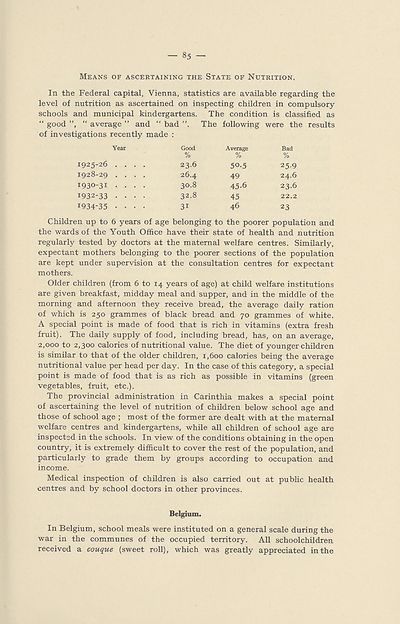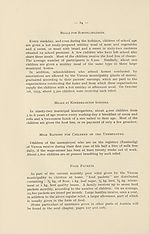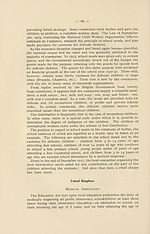Download files
Complete book:
Individual page:
Thumbnail gallery: Grid view | List view

85
Means of ascertaining the State of Nutrition.
In the Federal capital, Vienna, statistics are available regarding the
level of nutrition as ascertained on inspecting children in compulsory
schools and municipal kindergartens. The condition is classified as
“ good ”, ‘ average ” and ” bad
of investigations recently made :
Year
1925-26 ....
1928-29 ....
1930-31 ....
1932-33 ....
1934-35 ....
The following were the results
Good Average Bad
% % %
23.6 50.5 25.9
26.4 49 24.6
30.8 45.6 23.6
32.8 45 22.2
31 46 23
Children up to 6 years of age belonging to the poorer population and
the wards of the Youth Office have their state of health and nutrition
regularly tested by doctors at the maternal welfare centres. Similarly,
expectant mothers belonging to the poorer sections of the population
are kept under supervision at the consultation centres for expectant
mothers.
Older children (from 6 to 14 years of age) at child welfare institutions
are given breakfast, midday meal and supper, and in the middle of the
morning and afternoon they receive bread, the average daily ration
of which is 250 grammes of black bread and 70 grammes of white.
A special point is made of food that is rich in vitamins (extra fresh
fruit). The daily supply of food, including bread, has, on an average,
2,000 to 2,300 calories of nutritional value. The diet of younger children
is similar to that of the older children, 1,600 calories being the average
nutritional value per head per day. In the case of this category, a special
point is made of food that is as rich as possible in vitamins (green
vegetables, fruit, etc.).
The provincial administration in Carinthia makes a special point
of ascertaining the level of nutrition of children below school age and
those of school age ; most of the former are dealt with at the maternal
welfare centres and kindergartens, while all children of school age are
inspected in the schools. In view of the conditions obtaining in the open
country, it is extremely difficult to cover the rest of the population, and
particularly to grade them by groups according to occupation and
income.
Medical inspection of children is also carried out at public health
centres and by school doctors in other provinces.
Belgium.
In Belgium, school meals were instituted on a general scale during the
war in the communes of the occupied territory. All schoolchildren
received a couque (sweet roll), which was greatly appreciated in the
Means of ascertaining the State of Nutrition.
In the Federal capital, Vienna, statistics are available regarding the
level of nutrition as ascertained on inspecting children in compulsory
schools and municipal kindergartens. The condition is classified as
“ good ”, ‘ average ” and ” bad
of investigations recently made :
Year
1925-26 ....
1928-29 ....
1930-31 ....
1932-33 ....
1934-35 ....
The following were the results
Good Average Bad
% % %
23.6 50.5 25.9
26.4 49 24.6
30.8 45.6 23.6
32.8 45 22.2
31 46 23
Children up to 6 years of age belonging to the poorer population and
the wards of the Youth Office have their state of health and nutrition
regularly tested by doctors at the maternal welfare centres. Similarly,
expectant mothers belonging to the poorer sections of the population
are kept under supervision at the consultation centres for expectant
mothers.
Older children (from 6 to 14 years of age) at child welfare institutions
are given breakfast, midday meal and supper, and in the middle of the
morning and afternoon they receive bread, the average daily ration
of which is 250 grammes of black bread and 70 grammes of white.
A special point is made of food that is rich in vitamins (extra fresh
fruit). The daily supply of food, including bread, has, on an average,
2,000 to 2,300 calories of nutritional value. The diet of younger children
is similar to that of the older children, 1,600 calories being the average
nutritional value per head per day. In the case of this category, a special
point is made of food that is as rich as possible in vitamins (green
vegetables, fruit, etc.).
The provincial administration in Carinthia makes a special point
of ascertaining the level of nutrition of children below school age and
those of school age ; most of the former are dealt with at the maternal
welfare centres and kindergartens, while all children of school age are
inspected in the schools. In view of the conditions obtaining in the open
country, it is extremely difficult to cover the rest of the population, and
particularly to grade them by groups according to occupation and
income.
Medical inspection of children is also carried out at public health
centres and by school doctors in other provinces.
Belgium.
In Belgium, school meals were instituted on a general scale during the
war in the communes of the occupied territory. All schoolchildren
received a couque (sweet roll), which was greatly appreciated in the
Set display mode to:
![]() Universal Viewer |
Universal Viewer | ![]() Mirador |
Large image | Transcription
Mirador |
Large image | Transcription
Images and transcriptions on this page, including medium image downloads, may be used under the Creative Commons Attribution 4.0 International Licence unless otherwise stated. ![]()
| League of Nations > Economic and financial section > Problem of nutrition > (87) |
|---|
| Permanent URL | https://digital.nls.uk/190924893 |
|---|
| Shelfmark | LN.II |
|---|
| Description | Over 1,200 documents from the non-political organs of the League of Nations that dealt with health, disarmament, economic and financial matters for the duration of the League (1919-1945). Also online are statistical bulletins, essential facts, and an overview of the League by the first Secretary General, Sir Eric Drummond. These items are part of the Official Publications collection at the National Library of Scotland. |
|---|---|
| Additional NLS resources: |
|

